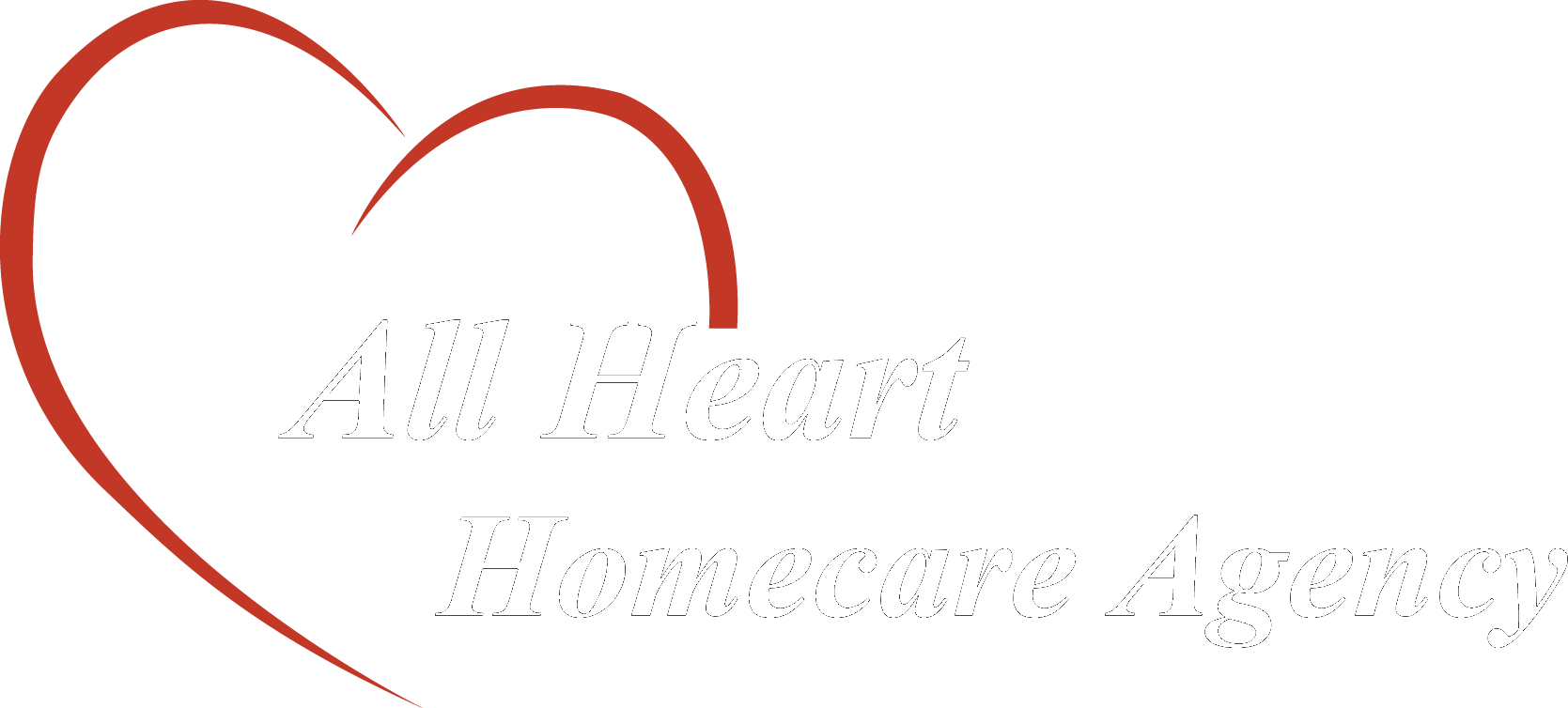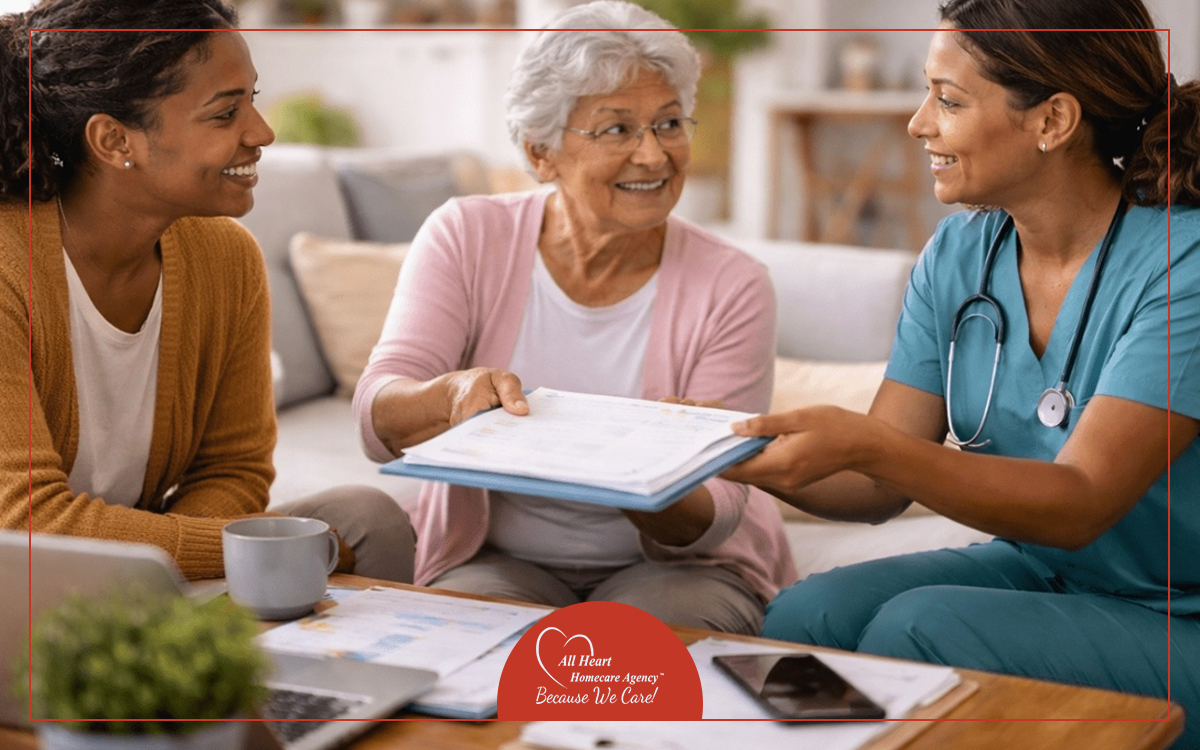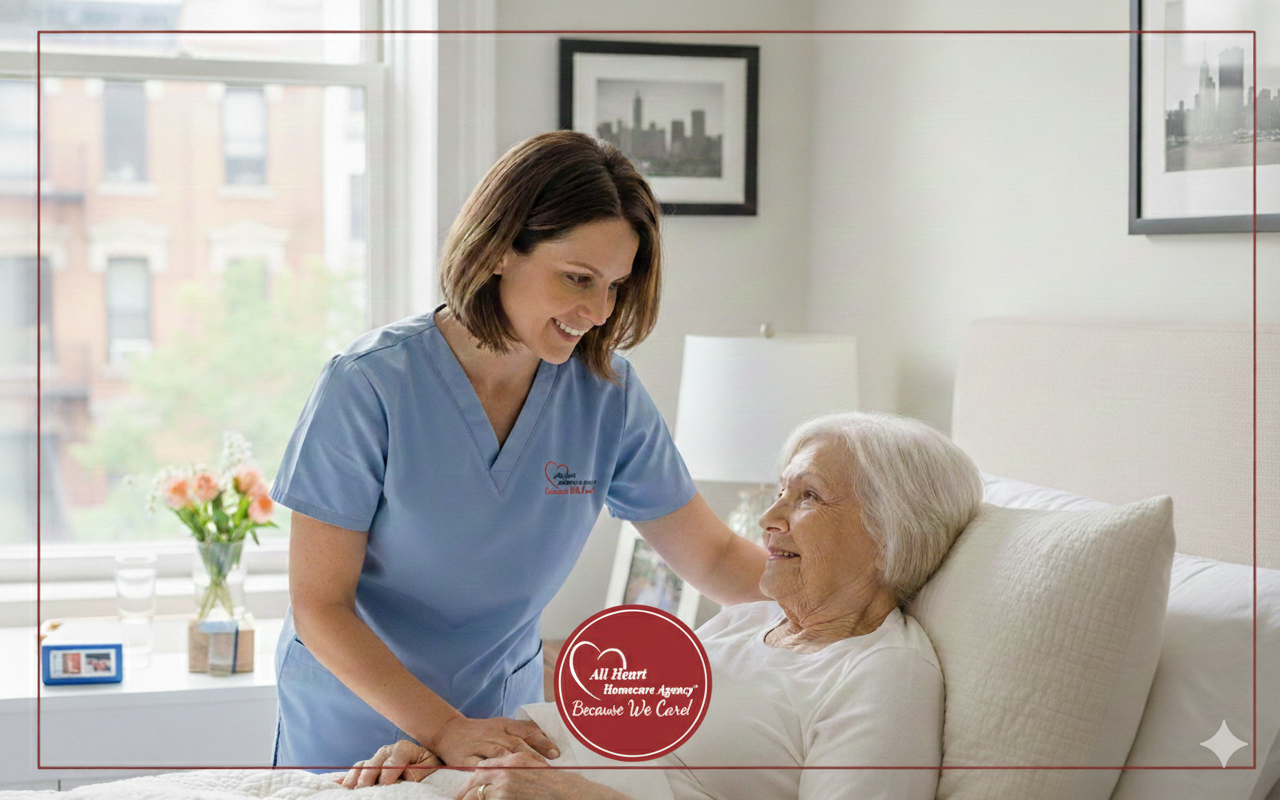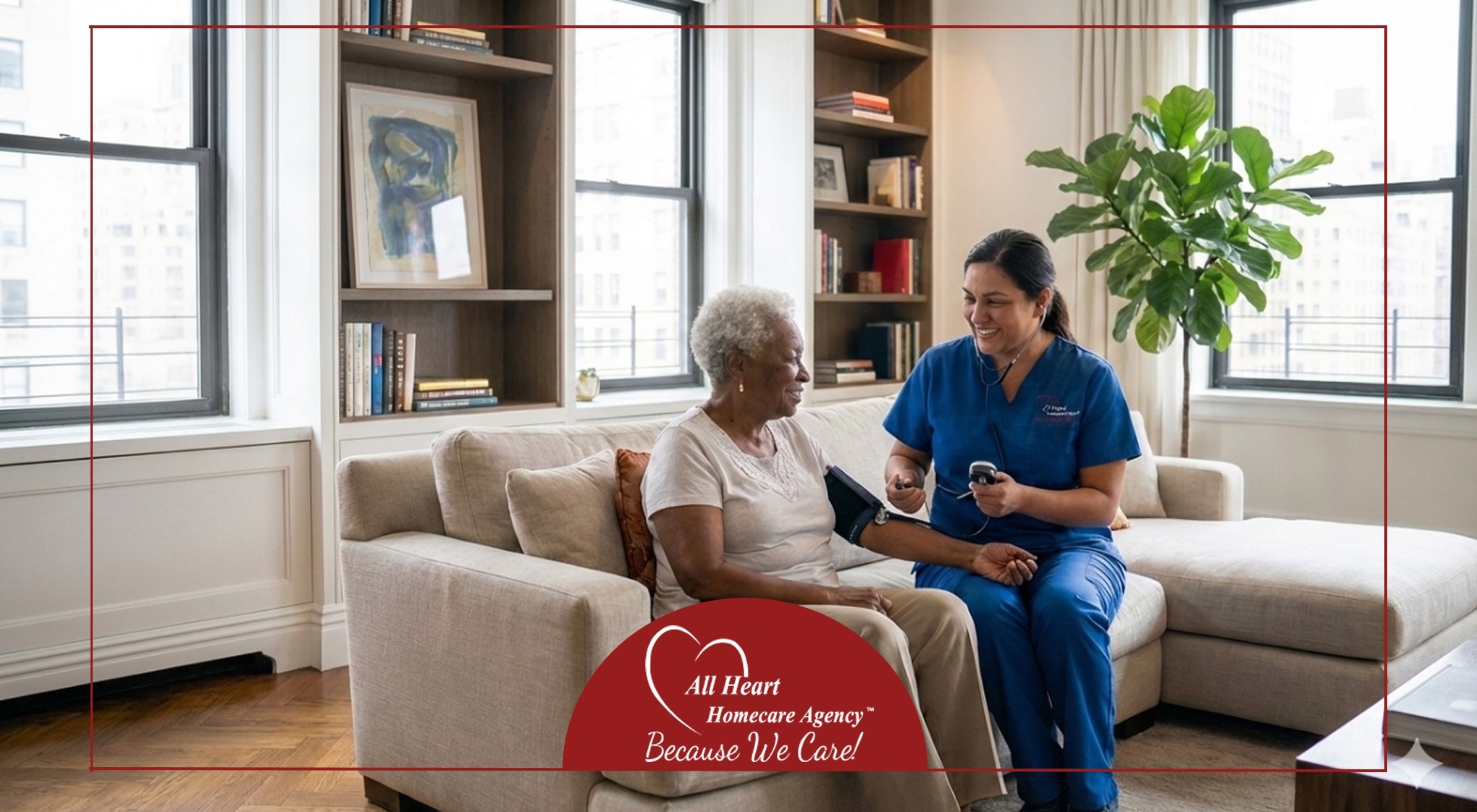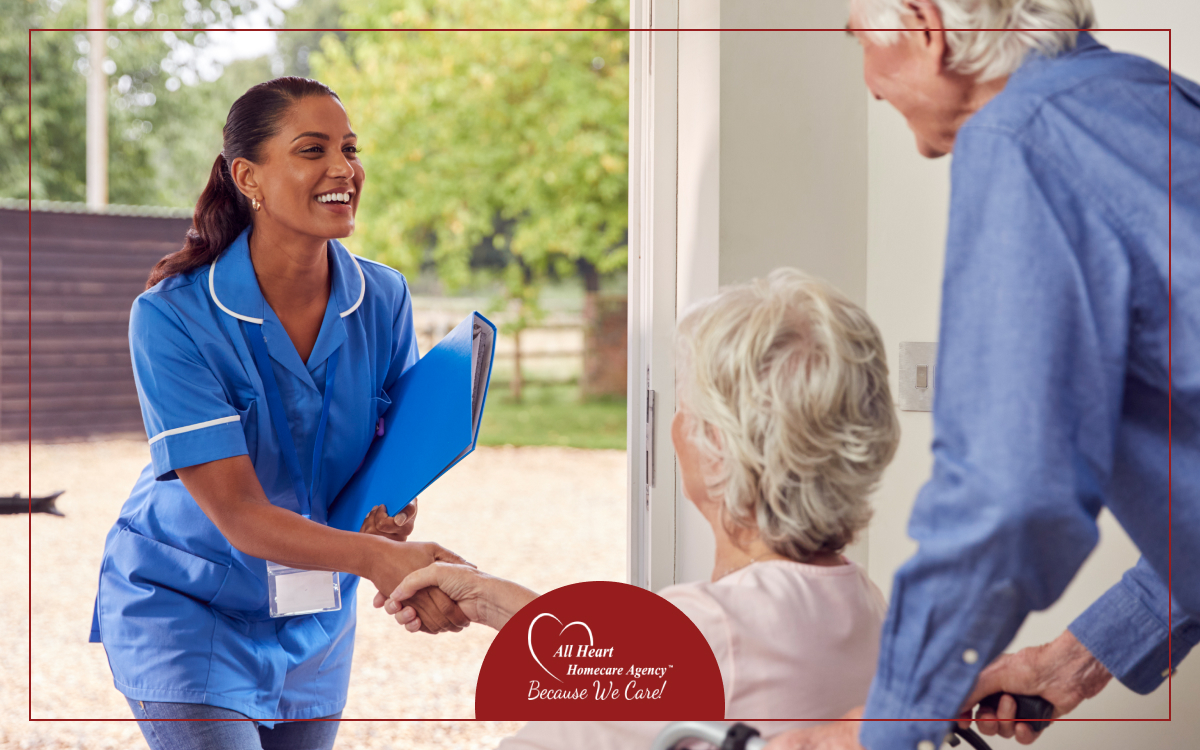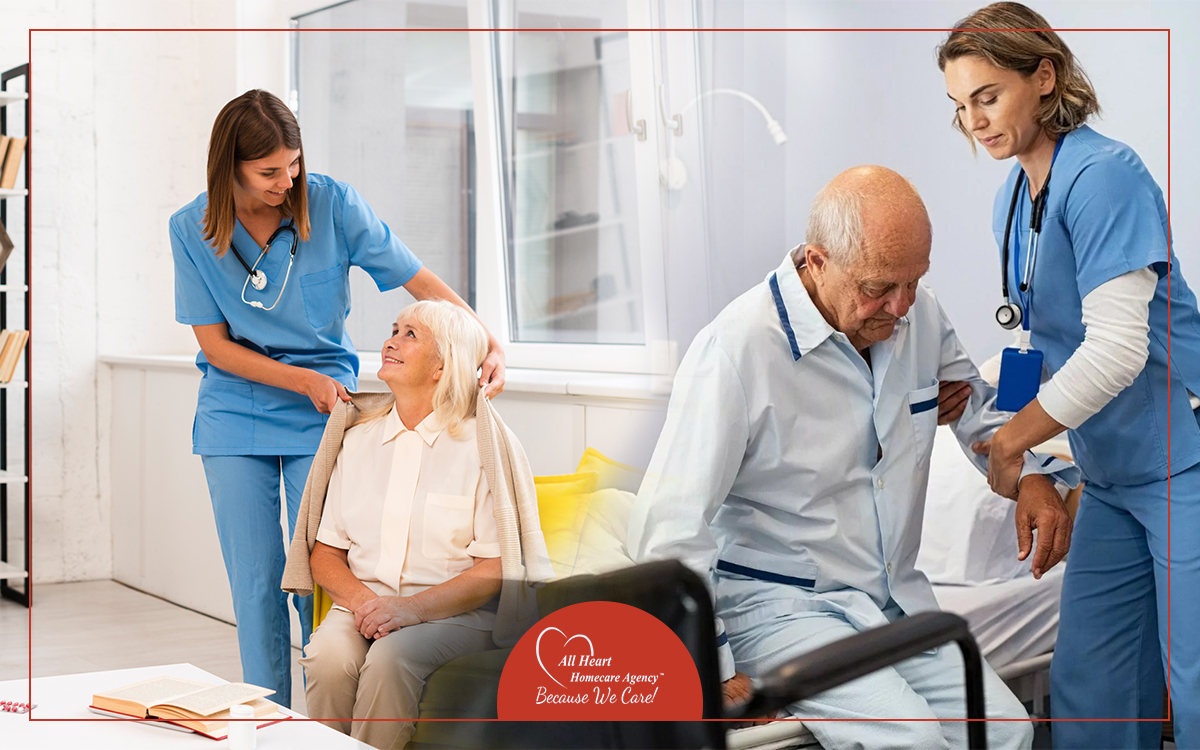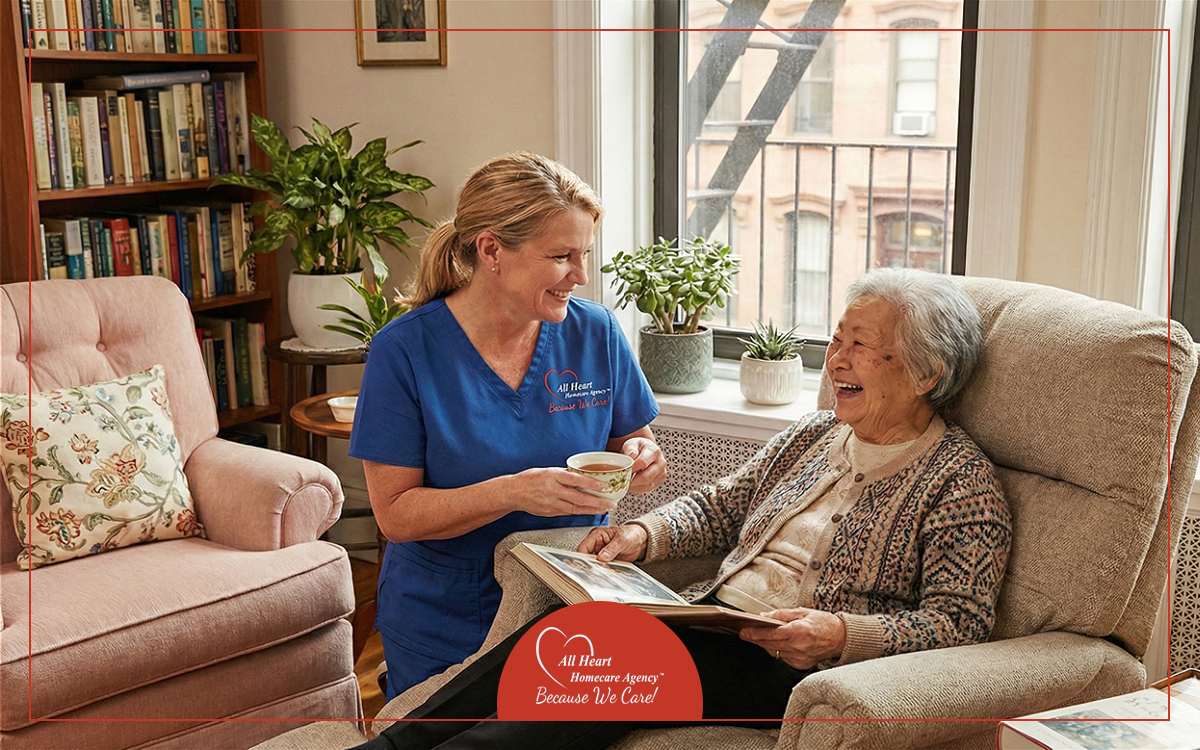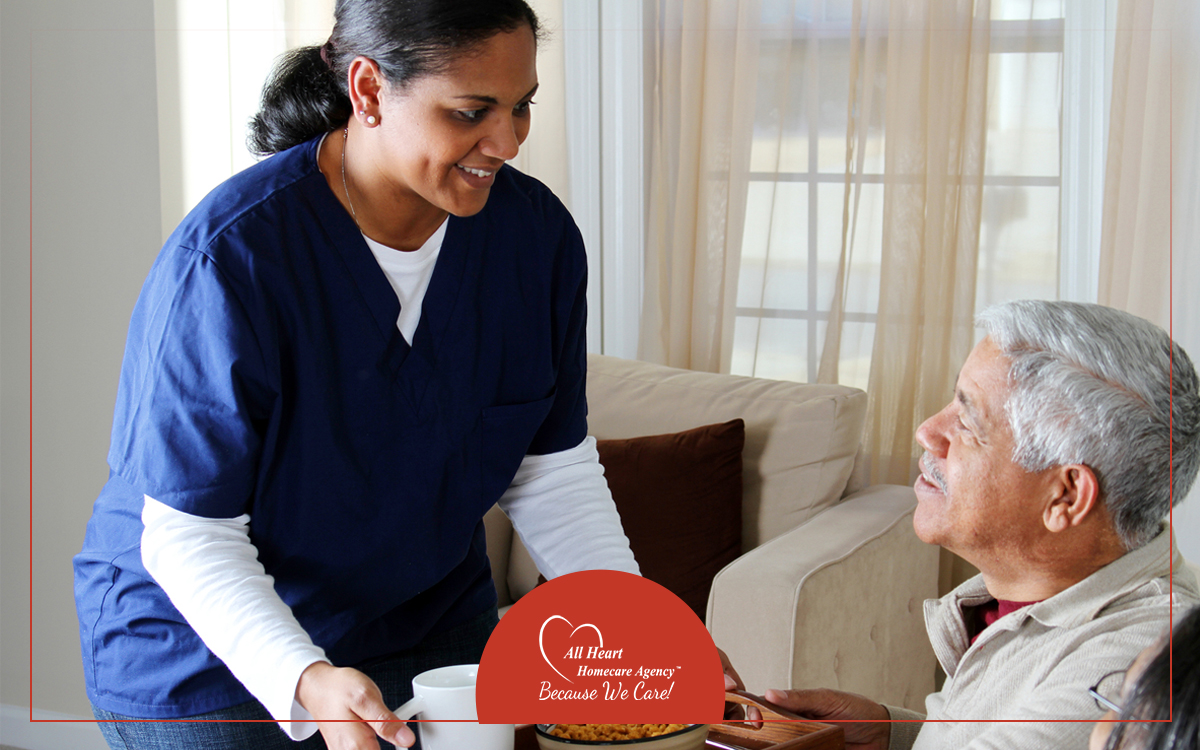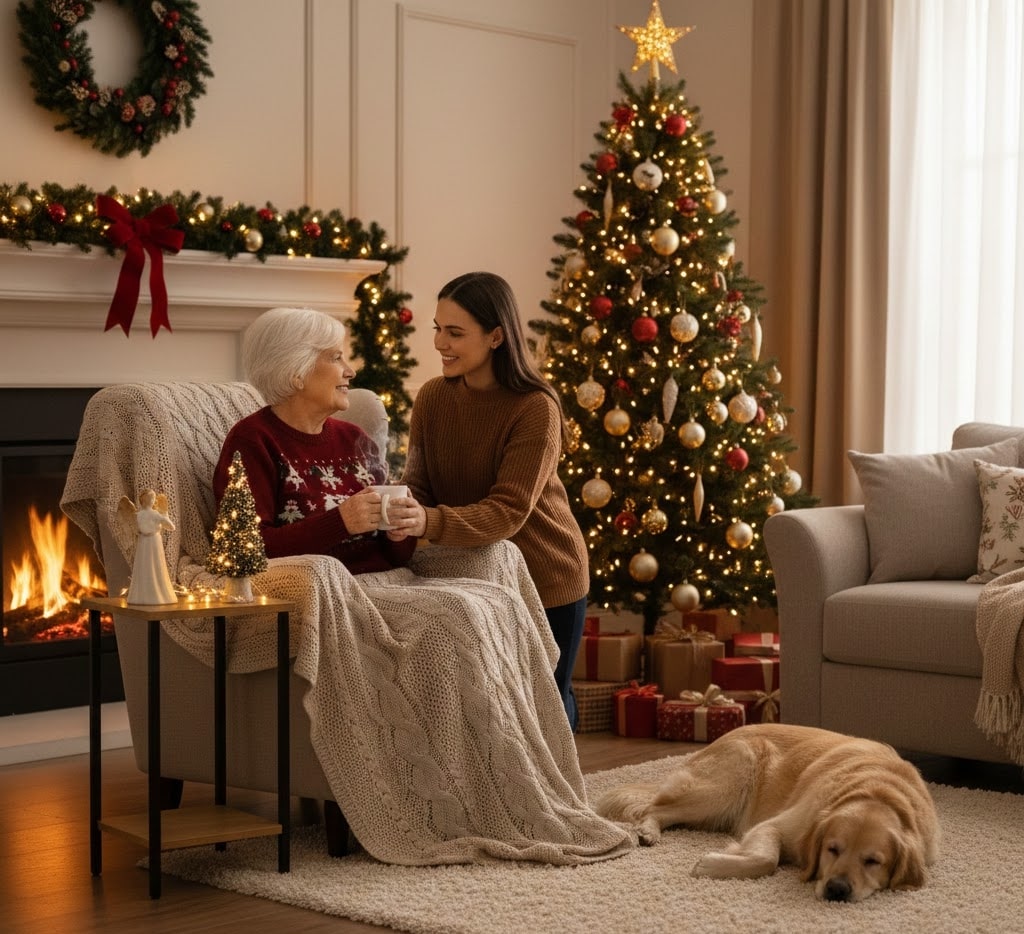Winter brings cozy sweaters, hot cocoa, and holiday celebrations. But for seniors and their families, the cold weather months also bring unique challenges that require thoughtful preparation. From icy sidewalks to heating concerns, winter safety deserves your attention now, before the first snowflake falls.
The good news? With the right preparation, seniors can enjoy winter just as much as any other season. This guide walks you through everything you need to know to keep your loved ones safe, healthy, and happy when temperatures drop. Whether you’re a family caregiver or helping an aging parent prepare their home, these practical tips will give you confidence and peace of mind throughout the winter months.
Preparing the Home for Winter
A warm, safe home forms the foundation of senior winter safety. Start your winter preparation by focusing on these essential areas:
Heating System Check-Up
Schedule a professional inspection of your heating system before cold weather arrives. A well-maintained furnace or heating system runs more efficiently and reduces the risk of carbon monoxide exposure. Don’t forget to replace air filters and test smoke and carbon monoxide detectors monthly.
Seal Out the Cold
Check windows and doors for drafts that let cold air sneak in. Weather stripping and caulking are inexpensive fixes that make a big difference in keeping rooms warm and reducing heating bills. Heavy curtains provide extra insulation during nighttime hours.
Build an Emergency Kit
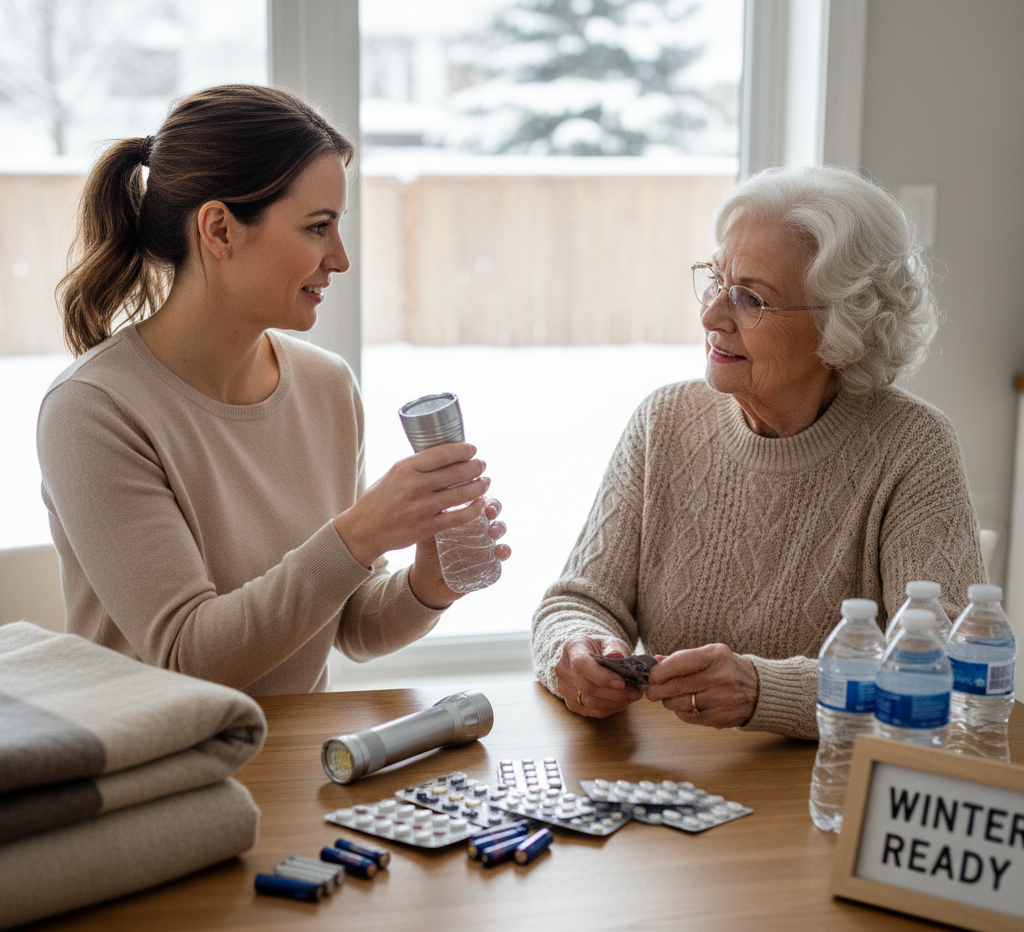
Winter storms can knock out power without warning. Assemble a kit containing:
| Emergency Kit Essentials | Why You Need It |
| Flashlights and extra batteries | Power outages happen frequently in winter |
| Non-perishable food and water (3-day supply) | Stores may be inaccessible during storms |
| Medications (week’s supply) | Delays in pharmacy access during emergencies |
| First aid supplies | Quick response to minor injuries |
| Battery-powered radio | Stay informed about weather conditions |
| Blankets and warm clothing | Maintain body temperature if heat fails |
Keep Pathways Clear
Ice and snow create serious fall risks. Arrange for regular snow removal from driveways, walkways, and stairs. Salt or sand provides traction on icy surfaces. Good outdoor lighting helps identify slippery spots before they cause problems.
Health and Wellness in Cold Weather
Cold weather affects senior health in ways many people don’t expect. Taking proactive steps protects both physical and mental well-being.
Stay Warm Inside and Out
Seniors feel cold more easily than younger adults. Keep indoor temperatures at 68°F (20°C) or warmer. Layer clothing rather than relying on a single heavy sweater. Base layers made of moisture-wicking fabrics work better than cotton, which holds dampness against the skin.
When heading outdoors, dress in layers you can adjust as needed. Always wear:
- A warm hat (you lose significant body heat through your head)
- Insulated, waterproof gloves or mittens
- A scarf to protect your neck and face
- Warm, waterproof boots with good traction
Nutrition and Hydration Matter
Proper nutrition and hydration are essential year-round, and the cold weather doesn’t change that. In fact, your body often works harder in the winter to maintain its core temperature, which requires plenty of fuel and fluids to function properly. Hearty, hot meals like soups and stews are a wonderful way to provide both warmth and vital nutrition. Sipping on warm beverages, such as herbal tea or even warm water with lemon, is a comforting way to stay hydrated.
While caffeinated drinks like coffee and black tea are fine in moderation, they can have a mild dehydrating effect, so remember to balance them with plenty of water throughout the day to ensure you’re getting the hydration your body needs.
Get Your Flu Shot
Winter brings flu season, and seniors face higher risks of complications. Schedule annual flu vaccinations early in the season, ideally by the end of October. Regular check-ups help catch potential health issues before they become serious problems.
Recognize Warning Signs
Hypothermia and frostbite are very real and serious dangers that our beloved seniors can face during the colder months. It’s so important to be vigilant and recognize the warning signs, as early detection can make all the difference.
- Hypothermia: This occurs when the body loses heat faster than it can produce it. Please watch carefully for these symptoms: shivering, confusion, slurred speech, drowsiness, and weak pulse. These are indicators that the body’s core temperature has dropped to a dangerously low level.
- Frostbite signs: Which is damage to the skin and underlying tissues caused by extreme cold, look for areas of numbness, skin that appears white or grayish, or skin that feels unusually firm or waxy to the touch. These are critical clues that frostbite may be setting in.
If you notice these symptoms, seek medical attention immediately.
Preventing Slips, Trips, and Falls
Falls represent the leading cause of injury among seniors, and winter conditions increase this risk significantly. Taking preventive measures makes a meaningful difference.
Choose the Right Footwear
Invest in quality boots with:
- Non-slip rubber soles with deep treads
- Good ankle support
- Room for warm socks without cramping toes
- Easy-to-use closures (avoiding complicated laces)
Consider ice cleats that attach to shoes for extra traction on extremely icy days.
Use Mobility Aids Without Hesitation
Canes, walkers, and other mobility aids are not signs of weakness; rather, they are intelligent tools designed to provide stability and prevent falls, ensuring your safety. We encourage you to embrace them as a means of maintaining your independence and confidence. For added security on slippery surfaces, consider adding ice tips to the ends of canes and walkers for a much better grip. When walking on ice or snow, it is always best to take smaller, more deliberate steps and move at a slow, careful pace to maintain your balance.
Maintain Safe Indoor Conditions
Winter tracking brings moisture indoors, creating slip hazards. Place absorbent mats at all entrances. Wipe up water promptly. Ensure adequate lighting throughout the home, especially in hallways, staircases, and bathrooms. Remove throw rugs that can bunch up and cause tripping.
Staying Socially Connected and Mentally Active
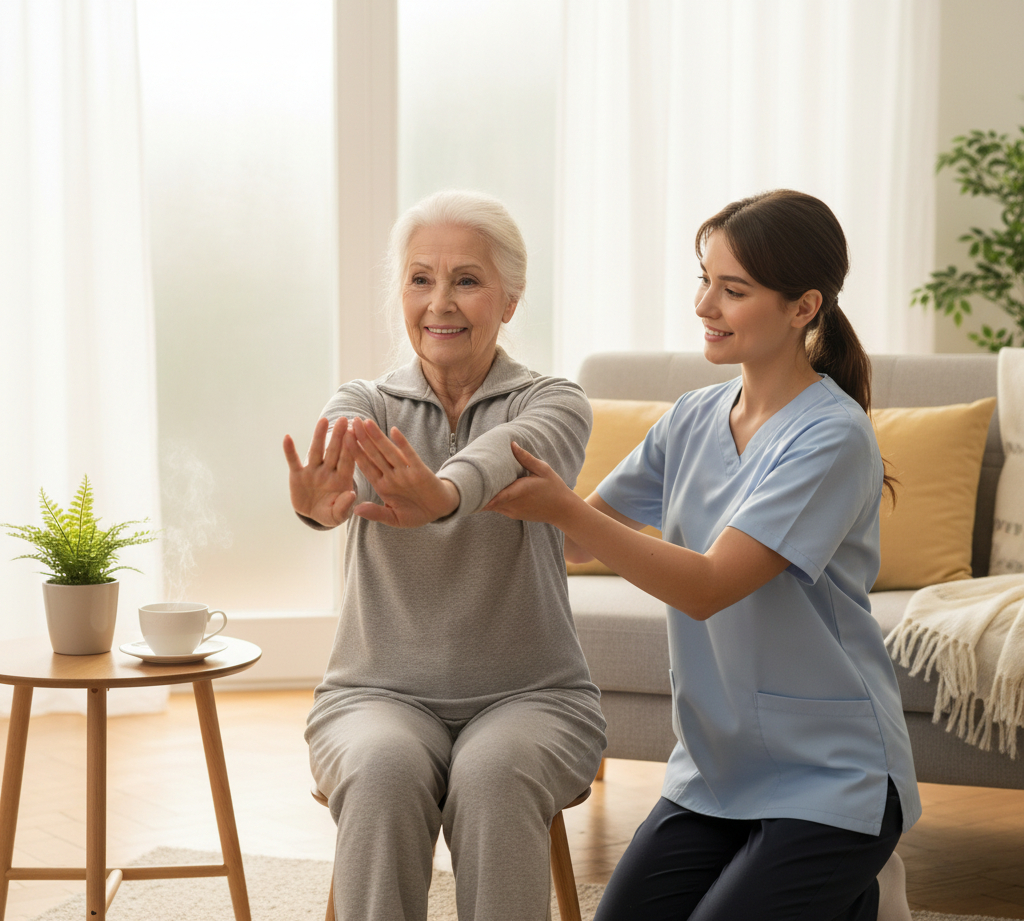
Winter’s shorter days and cold weather can lead to isolation, but staying connected protects mental health and overall well-being.
Welcome Safe Visits
Family and friends provide essential social connections. Schedule regular visits, even if brief. Video calls bridge distances when in-person visits aren’t possible. Many seniors have discovered the joy of connecting with grandchildren through FaceTime or Zoom.
Engage in Meaningful Activities
Keep your mind active with hobbies and interests. Reading, puzzles, crafts, and music all provide mental stimulation. Many community centers and libraries offer winter programming specifically designed for seniors, including book clubs, art classes, and educational workshops.
Tap Into Community Resources
Your local area likely offers valuable programs for seniors. The NYC Department for the Aging provides extensive resources for Brooklyn residents, including senior centers that offer fitness classes, social events, and nutritious meals. Libraries host free programs throughout the winter months. Organizations like the 92nd Street Y offer affordable continuing education classes that keep minds sharp and calendars full.
For more ideas on staying active during winter, explore our guide to senior-friendly activities in Brooklyn and NYC.
How Caregivers Make Winter Safer and Brighter
Professional caregivers bring specialized support that transforms winter from a challenging season into a comfortable one.
Never Face Winter Alone
Companionship matters more during the winter months when isolation risks increase. Professional caregivers provide consistent social interaction, engaging conversation, and a reassuring presence. They notice subtle changes in health or mood that family members might miss during less frequent visits.
Safety and Peace of Mind
Professional caregivers help with tasks that become more challenging in winter:
- Assistance with dressing in appropriate winter layers
- Support getting in and out of vehicles safely
- Transportation to medical appointments when roads are slippery
- Meal preparation focusing on warming, nutritious foods
- Light housekeeping to keep homes safe and comfortable
- Medication management to ensure proper timing and dosing
The Professional Care Advantage
At All Heart Homecare, our caregivers receive specialized training in fall prevention, cold weather safety, and recognizing early signs of hypothermia or illness. With over 13 years of experience serving Brooklyn and the surrounding boroughs, we understand the specific challenges winter brings to our community.
Our caregivers offer multilingual support in Russian and Spanish, among others, ensuring clear communication and cultural understanding. We create personalized care plans that address each senior’s unique needs, preferences, and winter safety concerns. Every caregiver undergoes comprehensive background checks and ongoing education to provide the highest quality care.
Learn more about our commitment to excellence in our 13-year anniversary reflection.
Make This Your Best Winter Yet
Winter preparation doesn’t have to feel overwhelming. Breaking it down into manageable steps makes the process straightforward and even enjoyable. Start with home safety, focus on health measures, prevent falls with proper footwear and clear pathways, and maintain those vital social connections.
Remember, you don’t have to navigate winter alone. Professional support exists to help seniors thrive during cold-weather months. Whether you need a few hours of assistance each week or comprehensive daily care, the right support makes winter a season to enjoy rather than endure.
Contact us NOW to find out how we can help you during the season! Our compassionate team at All Heart Homecare is ready to create a personalized winter care plan that keeps your loved ones safe, warm, and connected throughout the cold months ahead. Call us today or visit our website to learn more about our services in Brooklyn, the Bronx, Manhattan, Queens, and Staten Island.
Winter can be a wonderful season filled with warmth, connection, and peace of mind. Let’s make it happen together.
